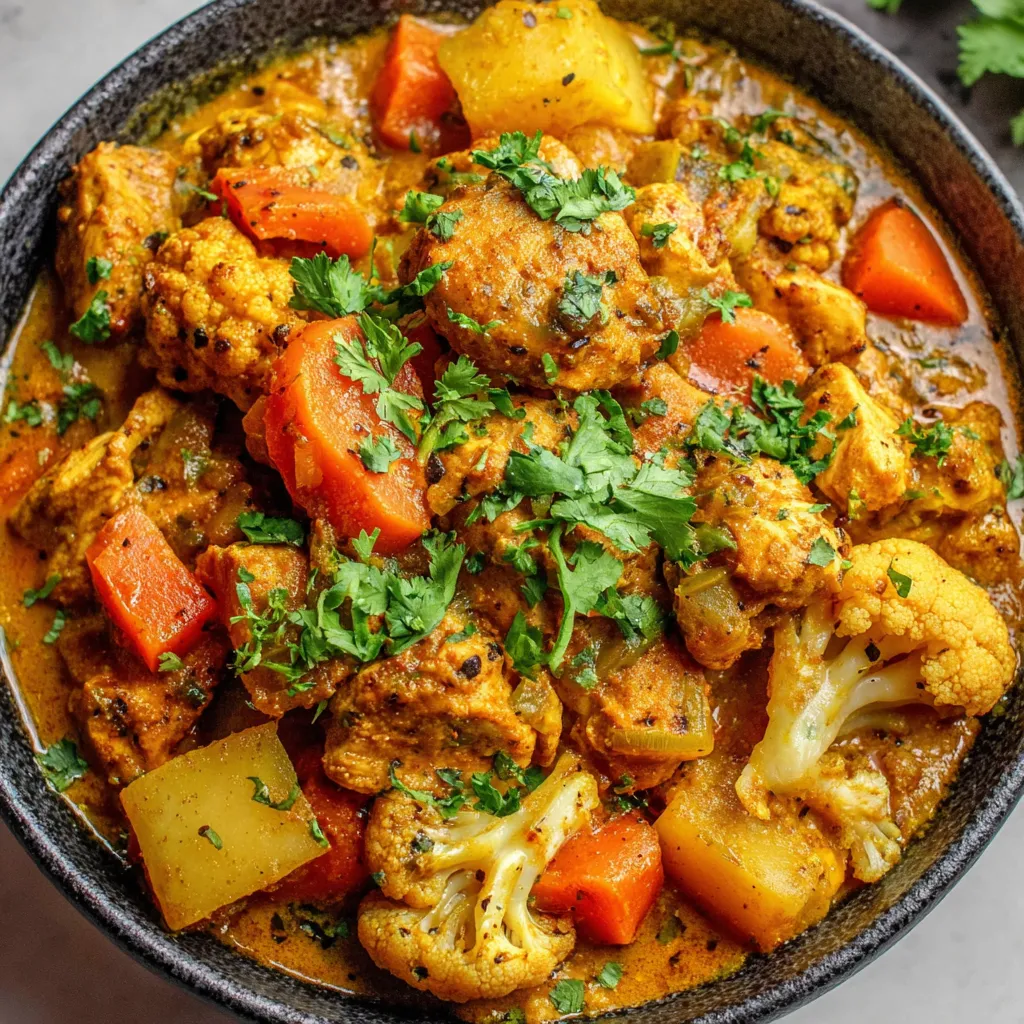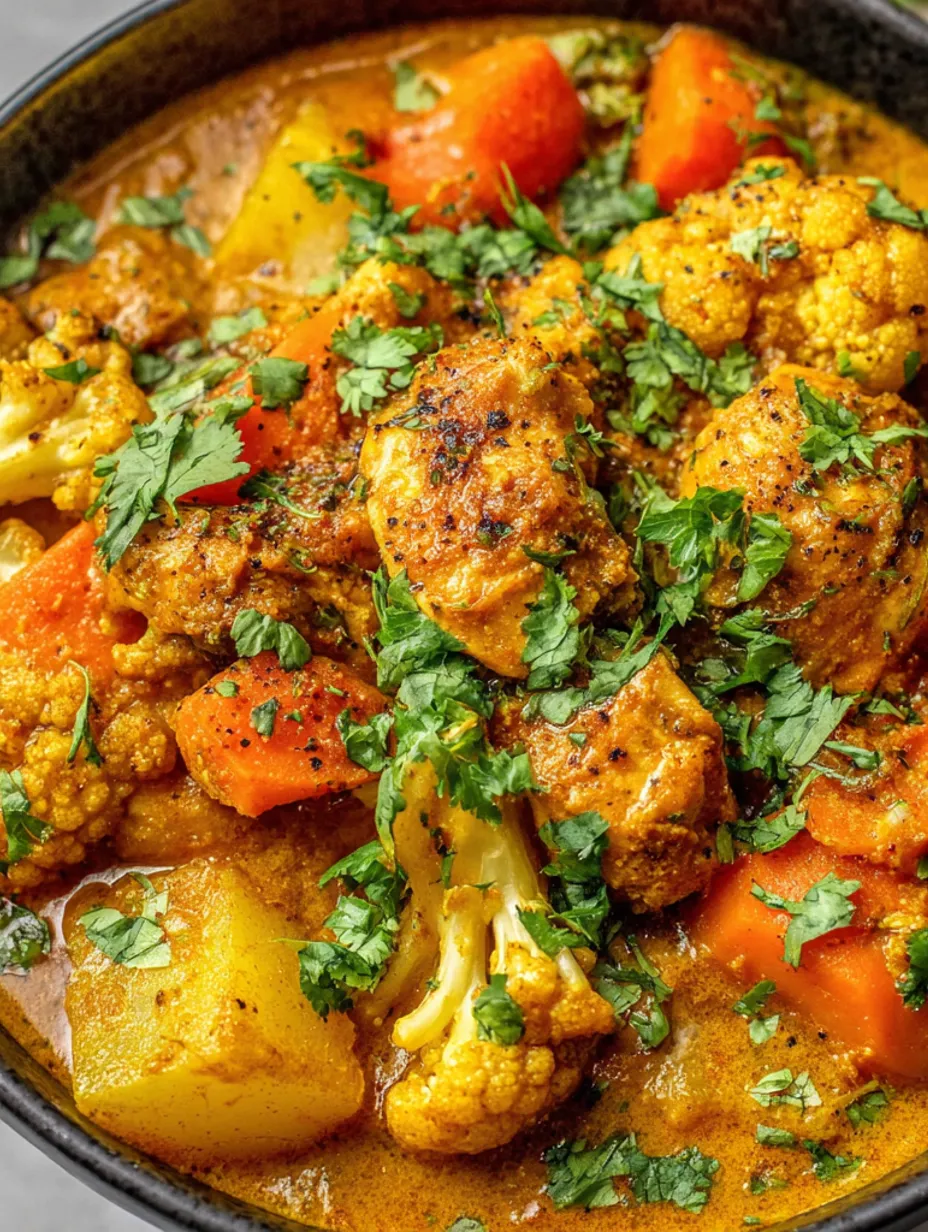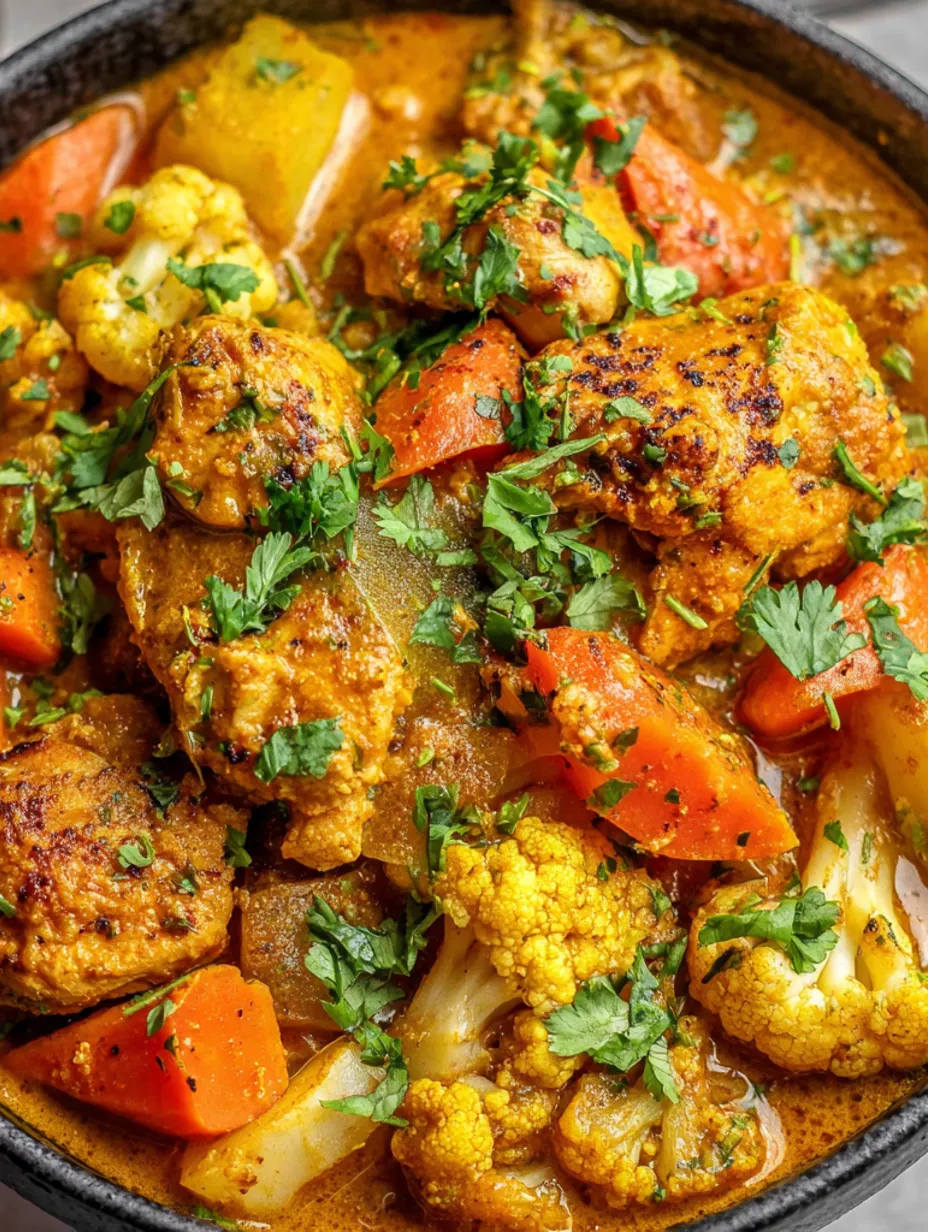 Bookmark
Bookmark
This aromatic cauldron curry has transformed my approach to weeknight dinners, bringing together the warming spices of traditional curry with hearty vegetables and tender protein. The dish bubbles away in one pot, filling your kitchen with an irresistible fragrance that draws everyone to the table. I developed this during a particularly busy autumn when I needed something that could simmer away while I handled other tasks, and it quickly became our family's comfort food staple.
I first made this curry on a chilly October evening when I wanted something that felt both nourishing and festive. The way it bubbles and steams in the pot reminded me of a magical cauldron, which is how it got its name. My children now request this specific curry whenever the weather turns cold, and I love how the entire house fills with those warm, spiced aromas.
Ingredients
- 1 pound chicken breast cubed or 1 pound firm tofu for vegetarians: Choose organic chicken for the best flavor or extra firm tofu that holds its shape well during cooking
- 1 large onion chopped: Yellow onions work best as they become sweet and mellow when cooked, forming the flavor foundation
- 3 cloves garlic minced: Fresh garlic is essential here, providing depth that powdered garlic cannot match
- 1 tablespoon fresh ginger minced: Look for firm, smooth ginger root without wrinkled skin for the most potent flavor
- 2 tablespoons curry powder: A good quality blend makes all the difference, opt for brands with visible whole spice pieces
- 1 can 14 ounces full fat coconut milk: The cream creates richness while the coconut adds subtle sweetness that balances the spices
- 1 cup chicken or vegetable broth: Choose low sodium varieties so you can control the final seasoning
- 1 cup potatoes diced: Yukon Gold potatoes hold their shape well and become creamy when cooked
- 1 cup carrots diced: Choose bright orange carrots that feel firm and heavy for their size
- 1 cup cauliflower florets: Fresh cauliflower should have tight, white florets with no brown spots
- 1 tablespoon olive oil: Extra virgin adds the best flavor for sautéing the aromatics
- Salt and freshly ground black pepper to taste: Always taste before adding, as broths vary in saltiness
- Fresh cilantro for garnish: The bright, herbal notes provide the perfect finishing touch
Step by Step Instructions
- Heat Oil and Build the Base:
- Heat olive oil in a large, heavy bottomed pot or Dutch oven over medium heat. The oil should shimmer but not smoke. Add the chopped onion and cook for about 4 minutes until it starts to soften and become translucent. Add minced garlic and ginger, stirring constantly for another minute until fragrant. This aromatic base is crucial for building layers of flavor throughout the curry.
- Toast the Spices:
- Sprinkle the curry powder over the softened onions and stir constantly for 60 seconds. You will hear the spices sizzle and see them darken slightly. This toasting step awakens the dormant oils in the spices and prevents any raw, powdery taste in the finished dish. The kitchen should fill with an incredible aroma at this point.
- Brown the Protein:
- Add the cubed chicken or tofu to the pot, stirring to coat with the spiced onion mixture. Cook for 5 to 6 minutes, turning the pieces occasionally until the chicken is lightly browned on most sides or the tofu develops a golden exterior. Do not worry about cooking the chicken completely through at this stage, it will finish cooking in the liquid.
- Add the Liquids:
- Pour in the coconut milk and broth, stirring well to combine and scrape up any browned bits from the bottom of the pot. These caramelized bits add tremendous flavor to the curry. The mixture should be smooth and creamy with no lumps of coconut milk remaining.
- Add Root Vegetables:
- Add the diced potatoes and carrots to the pot. These harder vegetables need the longest cooking time to become tender. Stir gently to distribute them evenly throughout the liquid. The curry should just barely cover the vegetables, add more broth if needed.
- Simmer and Add Cauliflower:
- Bring the mixture to a gentle boil, then reduce heat to low and cover partially. Simmer for 15 minutes, then add the cauliflower florets. Continue simmering for another 10 to 12 minutes until all vegetables are fork tender and the chicken is cooked through. The curry should be thick enough to coat a spoon but not paste like.
- Season and Finish:
- Remove from heat and taste for seasoning. Add salt and pepper as needed, keeping in mind that flavors will concentrate as the curry cools slightly. Let the curry rest for 5 minutes to allow the flavors to meld. Garnish generously with fresh cilantro just before serving to add brightness and color.
 Bookmark
Bookmark
The coconut milk in this curry is my secret weapon for creating restaurant quality richness at home. I learned from a Thai cooking class that full fat coconut milk should always be stirred before using, as the cream naturally separates. The way this curry transforms from simple ingredients into something magical never fails to amaze me, and the aroma alone is enough to make anyone feel welcomed and cared for.
Storage and Reheating Guidelines
Leftover curry keeps wonderfully in the refrigerator for up to 4 days in sealed containers. When reheating, do so gently over low heat, stirring occasionally and adding a splash of broth or water if the curry has thickened too much. You can also reheat individual portions in the microwave, stirring every 30 seconds to ensure even warming. The curry actually improves in flavor after a day or two as the spices have more time to marry together.
Smart Ingredient Swaps
This curry is incredibly adaptable to whatever you have on hand or dietary preferences. Sweet potatoes work beautifully in place of regular potatoes, adding natural sweetness that complements the spices. Green beans, bell peppers, or zucchini can substitute for any of the vegetables listed. For protein variations, try cubed lamb, shrimp added in the last 5 minutes of cooking, or chickpeas for a completely vegetarian version. If you cannot find curry powder, make your own blend with turmeric, cumin, coriander, and a pinch of cayenne.
Perfect Serving Ideas
This curry shines when served over fluffy jasmine or basmati rice that can absorb all those wonderful flavors. For a lower carb option, try it with cauliflower rice or spiralized zucchini noodles. Indian flatbreads like naan or roti are perfect for scooping up every last bit. I like to set out small bowls of extras like toasted coconut flakes, chopped peanuts, lime wedges, and extra cilantro so everyone can customize their bowl. A dollop of cooling yogurt helps balance the spices for those who prefer milder flavors.
 Bookmark
Bookmark
The Magic of Curry Spices
Curry powder is actually a British invention, created to mimic the complex spice blends used in Indian cooking. Traditional Indian cooks would blend their own garam masala and spice combinations for each dish, but curry powder provides an accessible way to achieve similar depth of flavor. The key is buying quality curry powder from spice shops or ethnic markets rather than old supermarket versions that may have lost their potency. Store your curry powder in a cool, dark place and replace it annually for the best flavor impact.
Frequently Asked Questions About Recipes
- → Can I make this curry ahead of time?
Yes, this curry actually improves in flavor when made ahead. Store it in the refrigerator for up to 3 days and reheat gently on the stove, adding a splash of broth or coconut milk if needed to thin the consistency.
- → What vegetables can I substitute in this curry?
You can easily swap in sweet potatoes, bell peppers, green beans, or peas. Root vegetables like parsnips or turnips work well too. Just adjust cooking times based on how long each vegetable needs to become tender.
- → How do I make the curry spicier or milder?
To increase heat, add cayenne pepper, fresh chilies, or hot curry powder. For a milder version, use sweet curry powder and add extra coconut milk. You can also balance spice with a touch of honey or brown sugar.
- → Can I use light coconut milk instead of regular?
Light coconut milk will work but creates a thinner, less creamy curry. For best results, use full-fat coconut milk, or mix light coconut milk with a splash of heavy cream to maintain richness.
- → What's the best way to serve this curry?
Serve over steamed jasmine or basmati rice, with naan bread on the side. You can also serve it with quinoa for a lighter option. Fresh cilantro, lime wedges, and plain yogurt make excellent garnishes.
- → How do I prevent the vegetables from becoming mushy?
Add harder vegetables like potatoes and carrots first, then add quicker-cooking vegetables like cauliflower in the last 10-15 minutes of cooking. This ensures everything finishes cooking at the same time with the right texture.
